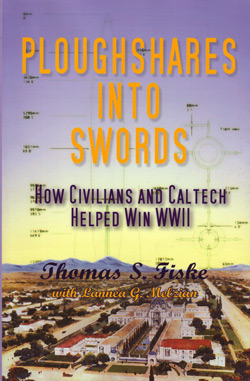Book Review: Ploughshares into Swords: How Civilians and Caltech Helped Win WWII, by Thomas S. Fiske with Lannea G. Melzian.
I tend to put myself to sleep every night with a book, and the last few days, Tom Fiske’s new  Plowshares into Swords has been my book of choice. I was born in 1950, so I missed the “Big War.” However, my father worked in the shipyard in Tacoma, Washington, in support of the war effort. As a child I heard many stories of the Second World War period, and although interesting, I certainly didn’t think of the time period has “history.” Now we’re over 60 years down the road, and the vast majority of Americans remember nothing of the War. It’s now history.
Plowshares into Swords has been my book of choice. I was born in 1950, so I missed the “Big War.” However, my father worked in the shipyard in Tacoma, Washington, in support of the war effort. As a child I heard many stories of the Second World War period, and although interesting, I certainly didn’t think of the time period has “history.” Now we’re over 60 years down the road, and the vast majority of Americans remember nothing of the War. It’s now history.
Let me say right up front that Ploughshares has been one of the most interesting, as well as educational reads that I’ve ever had. Goodness, can Tom ever put words together. I’ve read a number of volumes about WWII, but none that left me with more understanding of the civilian, as well as the major military event aspects of the time period. He weaves the home-front stories of individuals involved with design of rocketry and the atomic bomb, with a chronological narrative of the major events of the War. The book starts with events that were taking place as early as 1925, and runs through 1945.
Lannea G. Melzian, wife of Mel Melzian, contributed much of the story of CalTech, and her husband’s involvement with numerous aspects of the war effort. Her contributions included her own memories, as well as many letters, and documents from the time period. Mel worked with Douglas Aircraft, then CalTech, and was even made a made a Colonel for a while during 1945, when he was borrowed from CalTech by the War Department and sent to Europe to inspect and advise on the use of the rockets that were being designed by CalTech, and were helping to win the war.
The Melzians, as well as many other ordinary civilians gravitated to Caltech in Pasadena, California, to participate in the long-forgotten task of aircraft rocket design and manufacture. There was enough dry rocket fuel in the hills around Pasadena to blow it off the map. The rocket team also built the China Lake facility and then worked on the atomic bomb. Now we’re not talking about five-story rockets here, but small ones that could be hung under aircraft wings and fired on the fly (literally) – or barrage rockets that could even be fired from a ship or landing craft to clear the beachfront. These things had never been done before – but they were used successfully during the later years of WWII, and helped make the difference as to the eventual outcome.
Ploughshares tells about these adventures in the lives of ordinary Americans who saved tin foil and grease and old tires. Among its pages Ploughshares reveals several war time secrets, and the attitudes and methods of operation that allowed the United States, along with its allies, to win two huge distant wars simultaneously. In this age of whiners and complainers, there is much to learn from our parents, grandfathers and grandmothers who grimly held on, did what they knew had to be done, and left us speaking English, and not German or Japanese.
I recommend this book to my readers. It’s excellent, and you won’t be disappointed. It is one of the best books I’ve ever read.
Ploughshares into Swords: How Civilians and Caltech Helped Win WWII; Thomas S. Fiske with Lannea Melzian; ISBN: 978-1-935188-04-9; Non-Fiction; $22.95 USD; Soft Cover; 332 pages.